Secret Rivals
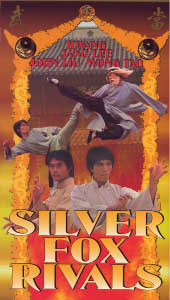
Reviewed by Yves Gendron
SECRET RIVALS is the film that back in 1976 truly
launched three bright stars of independent kung fu cinema, (two of
them the genre’s greatest kickers) Don Wong, John Liu and bootmaster supreme
Hwang Jang Lee. It also established the highly successful gimmick of having
two heroes with different fighting styles unite to fight an invincible adversary.
The movie however does not have a very auspicious beginning as it has very
much the look and feel of one of those dreadful seventies lame kung-fu schlock
films with very rough filmmaking, cheap production values and absolutely
horrid dubbing. As one of film’s first scenes is of a bad guy bullying a
whiny little kid, a prospective viewer may get a very poor first impression
of the film. The advice however is to stick around.
Somewhere in Korea, a local lord, of Chinese origin,
has organised a martial competition in order to select a new chief bodyguard.
Among the dozens of candidates there’s Sheng Ying-fei (Don Wong Tao) who’s
a Southern style exponent and Shao Yi-fei (John Liu) a master kicker, who
find themselves to be in each others way and develop an enmity for one another.
The local lord’s actual aim in getting a new bodyguard is to have him carry
out an assassination and then get rid of him easily. What he doesn’t know
though is that both Sheng and Shao have secret agendas of their own but the
tense rivalry between the two could now jeopardise each of their respective
plans, whatever they might be. Then there’s also the Silver Fox (Hwang
Jang Lee) to deal with, the local lord’s partner in crime, who’s a lethal
martial master.
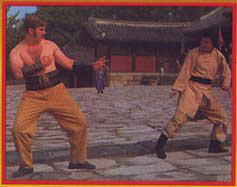
Besides the recurrent whiny kid, SECRET RIVALS also soon introduces the unexpected
appearance of an oafish Western brute, the “Russian World champion” who has
come it would seem all the way to Korea to participate in the contest and
makes an absolute boorish ass of himself in the process. Sigh. Thankfully
he’s gone after ten minutes. Thus despite some bothersome sightings overall,
the film holds together pretty well thanks to it’s two lead stars genial
charisma, the clouded intrigues surrounding their real intentions and the
dramatic tension that develops over their “secret rivalry” which keeps the
viewers on their toes. Then of course there are the fights that are terrific,
with Wong being a superbly fast and crisp fighter and Liu quite spectacular
with his kicks and flexibility. The film's best scene is the pair of them
doing warm-up exercises before a friendly bout together, (a scene obviously
borrowed from Bruce Lee’s WAY OF THE DRAGON) which allows them to display
their superb and sharp physicality. Hwang Jang Lee only shows-up in the second
half, he looks a bit silly with his fake wig and beard but he too is great
to watch.
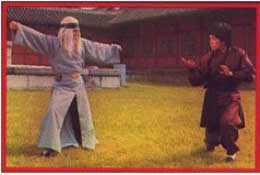
SECRET RIVALS is the work of Ng See-Yuen, who was in the seventies H-K cinema’s
first and foremost maverick independent martial art maker, deemed by local
film scholars as one of the most resourceful and innovative directors of
the period. He also had a knack at finding promising talent and picking up
on popular trends; sort of the Chinese Roger Corman of his time. Of course
much of his innovations are now lost on contemporary viewers because of the
age of the films but at the time they really rocked. Thus Ng pioneered the
use of real martial artists instead of trained actors or stuntmen and while
his film direction itself was rather rough he nonetheless developed some
cinematic techniques including slow motion and zoom lenses to make his fight
scenes more crisp and forceful than any one else’s. In the early seventies,
after directing a string of gritty k-f pot-boilers as the initial trend toward
k-f movies abated following Bruce Lee’s death, Ng turned towards crime-action
thrillers meeting great popular and critical success. Then in 1976, as the
martial art genre was starting to emerge out of it’s creative and popular
slump, he went back to it with a couple of catchy gimmicks as well as a trio
of performers of great talent but who all had a disappointing false start
in their film careers. These were Don Wong whose mop-head hairdo and feline
screen presence was more than evocative of Bruce Lee, John Liu a pupil of
already established martial art-star Tang Tao Liang and Hwang Jang Lee a
Korean Taekwondo exponent of powerful and spectacular kicking skills.
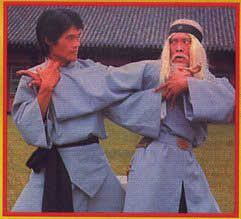
Ng See Yuen’s big gimmick for SECRET RIVALS was of course to pair two fighters
together with each of them using a vastly different martial style. One is
a Southern stylist (Don Wong) using mostly hand techniques and low kicks
while the other was a spectacular Northern kicker (John Liu) thus leading
to an eclectic kung-fu spectacle and hence to the film’s original Chinese
title: SOUTHERN FIST NORTHERN KICK. Still while it did not diminish Don Wong’s
involvement in the action in any way, with his two other co-stars being leg
fighters, the film was made into a real kick fest. That must have been a
most invigorating showcase at the time. Big kicks had seen great days in
the early seventies to mid-seventies (in particular with Bruce Lee who introduced
showy Taekwondo kicks into kung-fu cinema and the Angela Mao movies choreographed
by Sammo Hung), but with the coming of Shaolin k-f in 1974 that favoured
mostly hands techniques and low-kicks, high spectacular kicks had thus been
in retreat for a time. Until RIVALS brought back the move with a bang, thanks
to the great skills of his new performers, the cinematic techniques developed
by Ng See Yuen and the action choreography by Peking Opera trainees Ga, Ming
(better known under his English name Tommy Lee) and Chan Chuan, who designed
the action as a ferocious in your face ballet of death. Since they were at
the beginning of their film careers neither John Liu or Hwang had yet developed
their bag of tricks such as Liu holding his leg up in the air with his hand,
although he was already crushing jars in his training scene - a move
he would repeat adnauseum for nearly all of his movies.
Ng See-yuen’s other major idea for his movie was
to develop a rivalry between his two heroes thus creating a network of dramatic
tension and intrigue that would grip the viewer. A lethal feud between a
Northern and Southern master or school is actually one of the favourite plot
devices found in martial literary art or cinematic fiction and there’s at
least a dozen Shaolin movies where the heroes have to fight a master of the
Eagle Claws, the Mantis Fist or Wu-Tang, all Northern related styles. In
SECRET RIVALS however the tangible friction is between what looks to be the
films two heroes. Something that this reviewer would very much like to know
though is if in the movie’s original Mandarin dub whether Wong and Liu’s
characters had a distinct accent that would have indicated a peculiar regional
background. As this reviewer understands it, for a variety of social/cultural
reasons, in China, Northern and Southern folks often don’t quite see each
other eye to eye. It was an uneasy relationship that for a time was especially
exacerbated in the southern city of Hong Kong which for decades served as
a safe-haven for millions of Chinese, a good deal of them Northern refugees
fleeing either the Japanese invasion, the civil war of the thirties as well
as the Communists take over of the Mainland with a result that Hong Kong
became an over-crowded urban refugee camp. Ng See-Yuen must have been
keenly aware of the Northern/Southern divide as he was born in Shanghai but
from Cantonese (meaning Southern) parents and was both raised and educated
in Shanghai then Hong-Kong. Small wonder then that he would eventually come-up
with this tale whose real inner drama rested on the fierce rivalry,
uneasy relationship and grudging respect between a Northern and Southern
fighter.
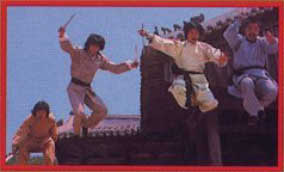
SECRET RIVALS was shot in Korea which was a popular shooting location from
the early seventies on for low budget k-f film production companies
because of the country’s low cost environment, beautiful pastoral scenery
and it’s many unspoiled temples that were used as sets. Usually though Korea
merely doubled for an ancient China setting. Here for once though the story
is truly set in Korea and the film makes great use of the local scenery,
including a giant Buddha statue and a couple of huge temple courtyards -
one in bricks and the other arranged in terraces. This creates a look so
exotic and elegant that it very quickly transcends the cheap look the film
seems to have at first and even gives it a touch of class, one that would
actually be hard pressed to find in more elaborate but more tacky looking
movie sets such as found in most seventies k-f film productions, even the
ones by the Shaw Brothers studio.
SECRET RIVALS was a huge hit across Southeast
Asia and helped revitalise martial art cinema in the second half of the seventies
thanks to it’s newly established stars and of course the fighting pair gimmick
which became almost instantly a standard within the genre. Up to three or
four dozen of such similarly themed movies thus appeared over the following
years, the bulk of it independent productions starring besides Liu and Wong
the likes of Tang Tao Liang, Chi Kwan Chun and several others. Fight arranger
Tommy Lee went on to choreograph a good many of these productions while also
frequently playing outlandish super k-f villain before becoming a k-f director
in his own right. None of these players however ever quite reached the cult
popularity of Hwang Jang Lee whose film career went higher and lasted a bit
longer than anyone else playing mostly superbly mean and cool bad-ass villains.
In fact, his cult fame was so great that when the video distribution company
Xenon released their version of RIVALS the title of the film was changed
to the awkward and absurd “SILVER FOX RIVALS” based on the name of Hwang’s
character in the movie’s English dubbed version (the character’s original
Chinese name though was “Bloody Fox”). For the most part Hwang worked for
Ng See Yuen to whom he was his ace in the hole.
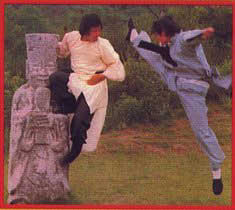
SECRETS RIVALS huge success served Ng See-yuen quite well as it firmly established
his newly found film company Seasonal on solid ground and after having two
more hits starring John Liu and Hwang Jang Lee SECRET RIVALS II and INVINCIBLE
ARMOUR he started a producing career. Over the years he discovered and promoted
promising new acting or directorial talents such as Corey Yuen, Conan Lee,
Tsui Hark and of course Yuen Woo Ping and Jackie Chan - producing for
them a groundbreaking pair of k-f comedies SNAKE IN THE EAGLE SHADOW
and DRUNKEN MASTER (both 78). But that’s another story.
So summing it up - despite it’s age, its wretched
dubbing, its horrid gweilos and whiny kid sightings all of these turned out
as only momentary distractions. Overall SECRET RIVALS remains quite appealing
on the basis of its action, its stars and its intrigue not to mention it
is historically relevant and therefore is a quite recommended find.
My rating for the film: 7.5
(Thanks for the special input from Linn Haynes)






